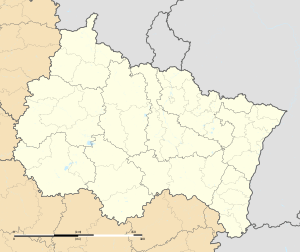Sainte-Menehould
| Sainte-Menehould | ||
|---|---|---|
| Commune | ||
|
The town hall | ||
| ||
 Sainte-Menehould Location within Grand Est region  Sainte-Menehould | ||
| Coordinates: 49°05′00″N 4°54′00″E / 49.0833°N 4.9°ECoordinates: 49°05′00″N 4°54′00″E / 49.0833°N 4.9°E | ||
| Country | France | |
| Region | Grand Est | |
| Department | Marne | |
| Arrondissement | Châlons-en-Champagne | |
| Canton | Argonne Suippe et Vesle | |
| Government | ||
| • Mayor (2001–2008) | Bertrand Courot | |
| Area1 | 57.11 km2 (22.05 sq mi) | |
| Population (2014)2 | 4,219 | |
| • Density | 74/km2 (190/sq mi) | |
| Time zone | UTC+1 (CET) | |
| • Summer (DST) | UTC+2 (CEST) | |
| INSEE/Postal code | 51507 /51800 | |
| Elevation | 132–261 m (433–856 ft) | |
|
1 French Land Register data, which excludes lakes, ponds, glaciers > 1 km2 (0.386 sq mi or 247 acres) and river estuaries. 2 Population without double counting: residents of multiple communes (e.g., students and military personnel) only counted once. | ||
Sainte-Menehould (French pronunciation: [sɛ̃t mənu]) is a commune in the Marne department in north-eastern France. The 18th-century French playwright Charles-Georges Fenouillot de Falbaire de Quingey (1727–1800) died in Sainte-Ménéhould. It was the subprefecture of the arrondissement of Sainte-Menehould until its abolition in April 2017.[1]
Cuisine
The town and its several restaurants pride themselves on serving a local specialty called pied de cochon or pig's trotter.
History
Dom Pérignon, the Benedictine monk who made important contributions to the production and quality of Champagne wine, and is often (erroneously) credited with its invention, was born in Sainte-Menehould around 1638.
Sainte-Menehould is the town where, during his Flight to Varennes in 1791, the king, Louis XVI was recognised, allegedly on account of the similarity between his face and the image of him that appeared on the coinage, during his attempted flight from Paris towards Flanders (then part of the Austrian empire and thereby ruled by his queen's older brother). The royal party left the town before the significance of the king's recognition had been acted upon, but they were pursued along the road towards Varennes and arrested by Citizen Drouet who is remembered as the local postmaster.
130 years later Ste-Menehould was important in the Champagne Riots of 1910/1911.
Twinning
See also
References
External links
| Wikimedia Commons has media related to Sainte-Menehould. |
.svg.png)